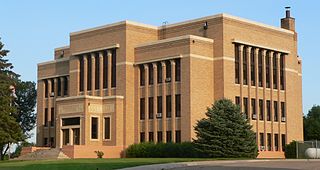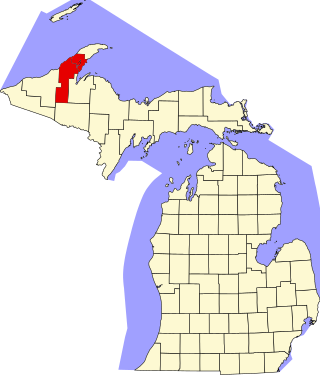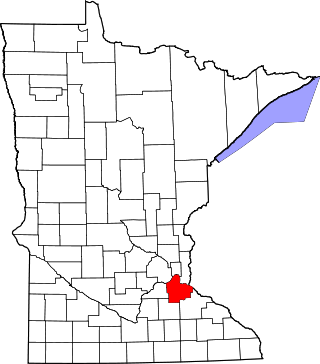
Charles Mix County is a county in the U.S. state of South Dakota. As of the 2020 United States Census, the population was 9,373. Its county seat is Lake Andes. The county was created in 1862 and organized in 1879. It was named for Charles Eli Mix, an official of the Bureau of Indian Affairs influential in signing a peace treaty with the local Lakota Indian tribes. The easternmost approximately 60% of the county comprises the Yankton Indian Reservation.

Geddes is a city in central Charles Mix County, South Dakota, United States. The population was 156 at the 2020 census.

Black Elk Peak is the highest natural point in the U.S. state of South Dakota and the Midwestern United States. It lies in the Black Elk Wilderness area, in southern Pennington County, in the Black Hills National Forest. The peak lies 3.7 mi (6.0 km) west-southwest of Mount Rushmore. At 7,244 feet (2,208 m), it is the highest summit in the United States east of the Rocky Mountains. Though part of the North American Cordillera, it is generally considered to be geologically separate from the Rocky Mountains.

This is a list of the National Register of Historic Places listings in Houghton County, Michigan.

Lac qui Parle State Park is a state park of Minnesota, United States, near Watson. Lac qui Parle is a French translation of the native Dakota name, meaning "talking lake".

Fort Totten State Historic Site is a historic fort that sits on the shores of Devils Lake near Fort Totten, North Dakota. During its 13 years of operation as a fort, Fort Totten was used during the American Indian wars to enforce the peace among local Native American tribes and to protect transportation routes. After its closing in 1890, it operated until 1959 as a Native American boarding school, called the Fort Totten Indian Industrial School. It was added to the National Register of Historic Places in 1971; in its nomination form, the State Historical Society of North Dakota called it "one of the best preserved military posts... in the Trans-Mississippi West for the Indian Wars period".
The South Dakota Department of Transportation (SDDOT) is a state government organization in charge of maintaining public roadways of the U.S. state of South Dakota. South Dakota has 82,447 miles of highways, roads and streets, as well as 5,905 bridges. The SDDOT is responsible for 7,830 miles of the roadway system.

This is a list of the National Register of Historic Places listings in Dakota County, Minnesota. It is intended to be a complete list of the properties and districts on the National Register of Historic Places in Dakota County, Minnesota, United States. Dakota County is located in the southeastern part of the U.S. state of Minnesota, bounded on the northeast side by the Upper Mississippi River and on the northwest by the Minnesota River. The locations of National Register properties and districts for which the latitude and longitude coordinates are included below, may be seen in an online map.

The House at 9 White Avenue in Wakefield, Massachusetts is a well-preserved transitional Queen Anne/Colonial Revival house. Built about 1903, it was listed on the National Register of Historic Places in 1989.

This is a list of the National Register of Historic Places listings in Aurora County, South Dakota.

This is a list of the National Register of Historic Places listings in Brookings County, South Dakota.

This is a list of the National Register of Historic Places listings in Jerauld County, South Dakota.

This is a list of the National Register of Historic Places listings in Lake County, South Dakota.

The Governor Leslie Jensen House, at 309 S. Fifth St. in Hot Springs, South Dakota, was built in 1899 for Christian Jensen, and it was the longtime home of Christian's son and South Dakota's 15th governor Leslie Jensen (1892–1964).

The Governor John L. Pennington House, at 410 E. Third St. in Yankton, South Dakota, was built in 1875. Also known as South Dakota Magazine Office in 1987, it is a simplified Italianate-style building. It was registered with the National Register of Historic Places in 1988.

Charles Emlen Bell (1858–1932), often known as C.E. Bell, was an American architect of Council Bluffs, Iowa and Minneapolis, Minnesota. He worked alone and in partnership with John H. Kent and Menno S. Detweiler. He also worked as part of Bell, Tyrie and Chapman. A number of his works are listed on the U.S. National Register of Historic Places.

St. Wenceslaus Parish is a Catholic parish of the Roman Catholic Diocese of Sioux Falls in Tabor, South Dakota in the Midwestern United States. Its historic red brick church, built in 1898, was listed as St. Wenceslaus Catholic Church and Parish House on the National Register of Historic Places on December 13, 1984, as part of a "Thematic Nomination of Czech Folk Architecture of Southeastern South Dakota".

The Hofmeister House is a house in White Lake, South Dakota. It was built in the Queen Anne style by Simon Pexa in 1912. It was added to the National Register of Historic Places in 2007.

The Lincoln House in Stickney, South Dakota was built in the Early Commercial architectural style by Sylvester Miller. It primarily functioned as a medical office for a Dr. Beukelman. It has two contributing buildings on the property.

The Lake Andes Carnegie Library, in Lake Andes, South Dakota in Charles Mix County, South Dakota, is a Carnegie library which was built in 1911. It was listed on the National Register of Historic Places in 2000.






















